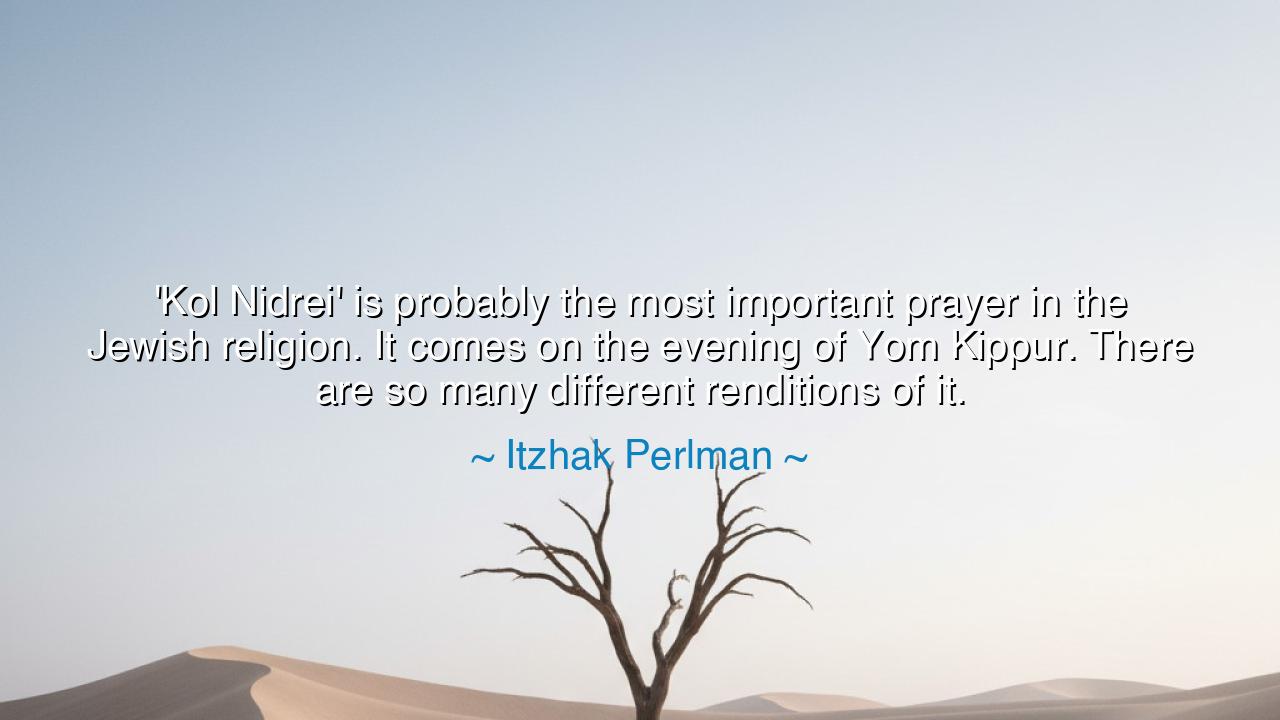
'Kol Nidrei' is probably the most important prayer in the Jewish
'Kol Nidrei' is probably the most important prayer in the Jewish religion. It comes on the evening of Yom Kippur. There are so many different renditions of it.






Hear, O listeners, the voice of Itzhak Perlman, master of the violin and interpreter of the human spirit, who declared: “Kol Nidrei is probably the most important prayer in the Jewish religion. It comes on the evening of Yom Kippur. There are so many different renditions of it.” In these words lies not only an observation about music and faith, but the weight of centuries of tradition, sorrow, repentance, and hope. For Kol Nidrei, though clothed in melody, is more than sound—it is a river of memory, flowing from generation to generation, carrying with it the burdens and vows of the human heart.
The origin of Kol Nidrei reaches back into medieval times. It is not a prayer in the usual sense, but a legal formula, a solemn declaration asking God to annul all vows made thoughtlessly or in weakness. Yet over centuries, it took on a power far beyond law. Sung at the opening of Yom Kippur, the Day of Atonement, it became the doorway into the holiest night of the Jewish year. Its melody, ancient and haunting, has pierced countless souls, reminding them of their frailty, their longing for forgiveness, and their yearning to be reconciled with the Eternal.
Consider its meaning. To stand at the threshold of Yom Kippur is to face the weight of one’s failures, the vows broken, the promises not kept. The human heart, though willing, often falters; words spoken in haste become burdens. Kol Nidrei gives voice to this frailty. It is the cry of humanity acknowledging weakness, pleading that broken promises not sever the bond between the soul and its Maker. Thus it is sung not only in words, but in tones that tremble with sorrow and rise with hope.
There is a story told of the Jews of Spain during the Inquisition. Forced to convert or face death, many outwardly conformed but secretly clung to their faith. On Yom Kippur, in hidden chambers, they would whisper Kol Nidrei, tears streaming, as they prayed for forgiveness for the vows of conversion made under duress. For them, the prayer was not only ritual, but survival, a fragile thread connecting them to their God and their people. This history deepens the meaning of Perlman’s words: Kol Nidrei is indeed “the most important prayer,” for it has carried a people through exile, fear, and longing, always reminding them of who they are.
And why so many renditions? Because each generation, each cantor, each soul hears in Kol Nidrei a reflection of its own struggle. Some chant it with solemnity, others with trembling weeping, others with grandeur. The melody is never fixed, for the burdens of humanity are never the same. Yet through its many variations, its essence endures: the recognition that man is fragile, and God is merciful. The music is not uniform, but the yearning is universal.
The lesson, then, is eternal. We are all creatures of frailty, making vows we cannot keep, promising more than we can deliver. Yet our worth is not destroyed by our weakness if we confess it, if we stand humbly before the truth of our lives. Kol Nidrei reminds us that brokenness is not the end; repentance and renewal are possible. It teaches that God’s mercy is greater than our failures, and that sincerity of heart can restore what carelessness of speech has broken.
Practical wisdom follows. Examine your words, and do not vow lightly. Acknowledge your limits, for humility guards the soul against despair. Seek forgiveness when you fail, and offer it freely to others who falter. And if your burdens feel too heavy, remember that like the haunting strains of Kol Nidrei, they may be lifted, transformed into music that rises from sorrow into hope.
Thus let the words of Itzhak Perlman echo: “Kol Nidrei is probably the most important prayer in the Jewish religion.” For it is not only the beginning of Yom Kippur, but the continual reminder that though we stumble in promises, we may rise again in mercy, and though our vows may falter, the eternal covenant of love between God and man endures.






AAdministratorAdministrator
Welcome, honored guests. Please leave a comment, we will respond soon